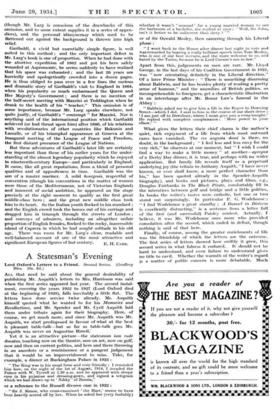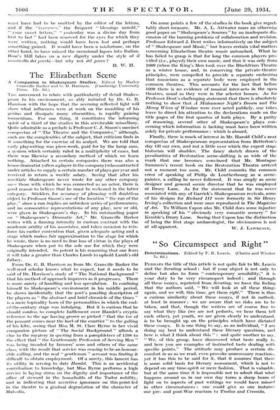A Statesman's Evening
ALL that need be said about the general desirability of publishing Mr. Asquith's letters to Mrs. Harrisson was said when the first series appeared last year. The .second instal- ment, covering the years 1922 to 1927 (Lord Oxford died at the beginning of 1928), falls inevitably a little flat. The letters have done service twice already. Mr. Asquith himself quoted what he wanted to for his Memories and Recollections, and Mr. Spender and Mr. Cyril Asquith kid them under tribute again for their biography. Here, of course, we get much more, and since Mr. Asquith was Mr. Asquith, we start predisposed in favour of what at the best is pleasant table-talk—but so far as table-talk goes Mr. Asquith was never an Augustine Birrell.'
Yet it is an attractive picture—the statesman tam rude donatus, touching now on the theatre, now on art, now on golf, now and then on current politics, and here and there throwing in an anecdote or a reminiscence or a pungent judgement that it would be an impoverishment to miss. Take, for example, a dinner at Buckingham Palace in 1923 " The King was in his usual form and very friendly : I reminded him how, on the night of the 1st of August, 1914, I invaded the Palace with W. Tyrrell at 1.30 a.m. and he appeared with sleepy eyes in his pyjamas and dressing-gown, and signed a telegram which'we had drawn up to Nikky ' of Russia," or a reference to the Russell divorce case in 1922 : - " Sir J. Simon, who cross-examined the Hart,' seems to have been heavily scored off by her. When he asked her (very foolishly) whether it wasn't unusual ' for a young married woman to use the bathroom of a bachelor, she replied at once : Well, Sir John, isn't it better to be indiscreet than dirty ? ' " or of Sir Oswald Mosley, then careering through his Liberal phase : " I went back to the House after dinner last night to vote and was rewarded by hearing a really brilliant speech from Tom Mosley, who is one of our best recruits, and the more welcome to us, and hated by the Tories, because he is Lord Curzon's son-in-law."
Apart from this, judgements on men are rare. Mr. Lloyd George, in the last days of his Coalition Government in 1922, was " now orientating definitely in the Liberal direction." Of a later Prime Minister : " There is something disarming about Baldwin, and he has besides plenty of reading a pretty sense of humour," and the amenities of British politics, so incomprehensible to foreigners, get a characteristic illustration. in an interchange after Mr. Bonar Law's funeral in the Abbey :
" Baldwin asked me to give him a lift in the Royce to Downing Street—which I did. I said to him in the course of our short drive am just off to Dewsbury, where I must give you a wang tonight.' He replied with complete complaisance ' More power to your elbow. "
What gives the letters their chief charm is the author's quiet, rich enjoyment of a life from which most outward cares have vanished. The res angusta domi is there, no doubt, in the background ; " I feel less and less envy for the very rich," he observes at one moment, but " I wish I could find a way to make a little money " at another—apropos of a Derby Day dinner, it is true, and perhaps with no wider application. But family life reveals itself as a perpetual underlying joy (the tribute to Anthony Asquith, " I have never known, or ever shall know, a more perfect character than his," has been quoted already in the Spender-Asquith biography), and books and pictures, plays and films, e.g., Douglas Fairbanks in The Black Pirate, comfortably fill in the interstices between golf and bridge and a little politics. In books the writer's tastes were catholic, but one or two stand out surprisingly. In particular P. G. Wodehouse : " I find Wodehouse a great standby ; A Damsel in Distress is excellently distracting," is a sentence from a letter full of the first (and successful) Paisley contest. Actually, I believe, it was Mr. Wodehouse once more who provided consolation after the second, which ended in defeat, though nothing is said of that here.
Finally, of course, among the greater enrichments of life was the friendship of which the letters are the outcome. The first series of letters showed how swiftly it grew, this second series in what fulness it endured. It should not be hard to understand, and even failure to understand gives no title to cavil. Whether the warmth of the writer's regard is a matter of public concern is more debatable. Much must have had to be omitted by the editor of the letters, and if the "&yawnriirn," the frequent " blessings untold," " your sweet letters," " yesterday was a divine day from first to last " had been reserved for the eyes for which they were written, nothing would have been lost and perhaps something gained. It would have been a misfortune, on the other hand, to have missed the occasional lapses into Italian. Boar's Hill takes on a new dignity under the style of it monticello dei porchi—but why not del porco?
H. W. H.





































 Previous page
Previous page